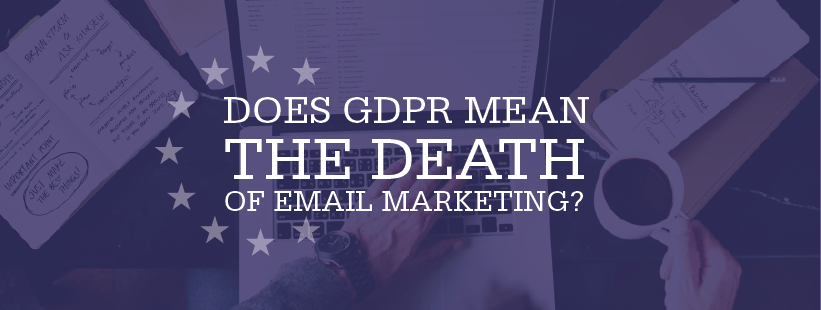Does GDPR mean the death of email marketing?

“Hi there, [name]! We’re updating our Privacy Policy!” Already sounding familiar? Of course it does. If you’re anything like me, you’ll have had what feels like hundreds of these emails over the past few weeks, as companies scramble to get themselves in line with the General Data Protection Regulation, the new set of laws that affect how your personal data is processed. It’s great news from a consumer point of view, but for business owners it poses a rather more worrying question. With the May 25th deadline having passed almost a full month ago, and GDPR officially in effect, does this mean the end for email marketing?
This can’t be the end for email marketing… can it?
As one email after another popped up in my inbox over the last few weeks, I was surprised at how often I found myself thinking “Hang on, I wonder how that company got my email? I definitely didn’t sign up to that one.” You’ve probably thought the same. How many email newsletters have you received lately that you don’t recall subscribing to in the first place, and are now getting in touch asking you to re-opt in? I think I can count on my fingers the number of ones I’ve signed back up to! Personally, I’ve been using it as a handy way to clear my inbox, and so have a lot of people I’ve spoken to recently.
Now, if you’re a business owner, just reading that might be making you a bit jittery already. You’re not alone, either; many businesses across the UK and beyond are worrying that GDPR could be decimating their customer databases. And those fears aren’t unfounded – there’s no denying GDPR is going to have a significant effect there. Lots of people, like me, are going to choose not to opt-back in. But don’t panic yet!
The big benefit of GDPR for business owners – and one that’s often overlooked – is that it will demand businesses to create better content that is more uniquely tailored to their clients and prospects. Starting now, email marketing is becoming less of a numbers game, relying simply on volume to get results. Instead, you have to be thinking more carefully about how to engage your customers.
The good news is that in many ways, that’s going to be easier. Sure, some people are going to leave, or ask to be forgotten. But once that’s done, the ones who remain will, by definition, be the ones who’ve actively chosen to hear from you. They’ll have given you clear, unambiguous consent. This means that most of the time you’ll be preaching to the choir, increasing the chances of successful conversions.
Plus, the other big advantage of GDPR is that it means the death of a number of nasty, spammy email tactics, paving the way for your business to benefit from increased trust from your customers. Some of these tactics include:
- Purchased databases – where a company you’ve signed up to sells your information to another company without your consent
- Pre-ticked checkboxes and other types of ‘assumed consent’
- Vague or unclear Terms and Conditions written in dense legalese, making them impossible to understand without a law degree
Pre-ticked checkboxes have always been particularly notorious. Even as a consumer, you’ll have probably seen the way some companies try and get round them with the use of weird double-negatives: e.g. ‘click here if you want to opt out from never hearing from us again.” GDPR means all that goes away, and while you might find revamping your Terms and Conditions to be a complete pain in the neck, the end result is that your business reaps the rewards from even greater trust in your brand.

Don’t neglect your social media!
So, how much has GDPR really affected email marketing? Well, as it’s only been a few weeks since the deadline passed, it’s still a bit too soon to tell! One area that we’ve certainly not seen affected here at 21Digital Agency, though, is social media.
Social media has long been a fantastic complement to email marketing, and in fact, it’s often considered a great alternative. After all, it does more than just broaden your reach; it’s arguably far better for actually engaging with your customers. There’s a reason why the most responsive businesses are by far and away the most successful on social media. It makes it faster and simpler than ever to properly interact with your customers in a public space, making it easier to form meaningful relationships with them and therefore build loyalty to your brand.
Plus, it helps you to effectively leap one of the biggest hurdles of GDPR. According to the regulation, it’s now illegal to send marketing emails without explicit consent. Technically, that also applies to outreach emails too. In other words, you can’t send unsolicited emails asking people whether they’d like to receive marketing emails, as that itself also counts as marketing. So, you might be asking, how the heck can you ever hope to build your customer base?
That’s easy: by using social media to close the gap. Not only can it help you form new relationships with your customers, but it can even help you to build your mailing list back up again. If you post a public invitation to your mailing list through your social media channels, then anyone who clicks through to sign up will have – by definition – chosen actively to do so. This fulfils the ‘explicit consent’ clause of GDPR, which means that any data you collect from them is therefore lawfully obtained. That means that as long as you process it according to the law, you don’t have to worry about falling afoul of GDPR.
Of course, there’s no one-size-fits-all digital strategy for every company; defining your specific commercial goals is the first step to digital success. Happily, that’s where I come in! As Account Manager here at 21Digital Agency, my job is to work with you to craft bespoke, innovative campaigns that are precisely tailored to your business, helping you get tangible results and the maximum return on your investment. You can click here to learn about 21Digital Agency social media marketing services, or just give us a call on 01254 660 560!

As 21Digital Agency Account Manager, Annmarie acts as the main point of contact for many of our clients. Her sharp marketing insight and keen business acumen means she’s adept at turning each client’s aims into a clear set of specific commercial objectives, and ensuring that each these aims are met through bespoke, creative marketing campaigns.










